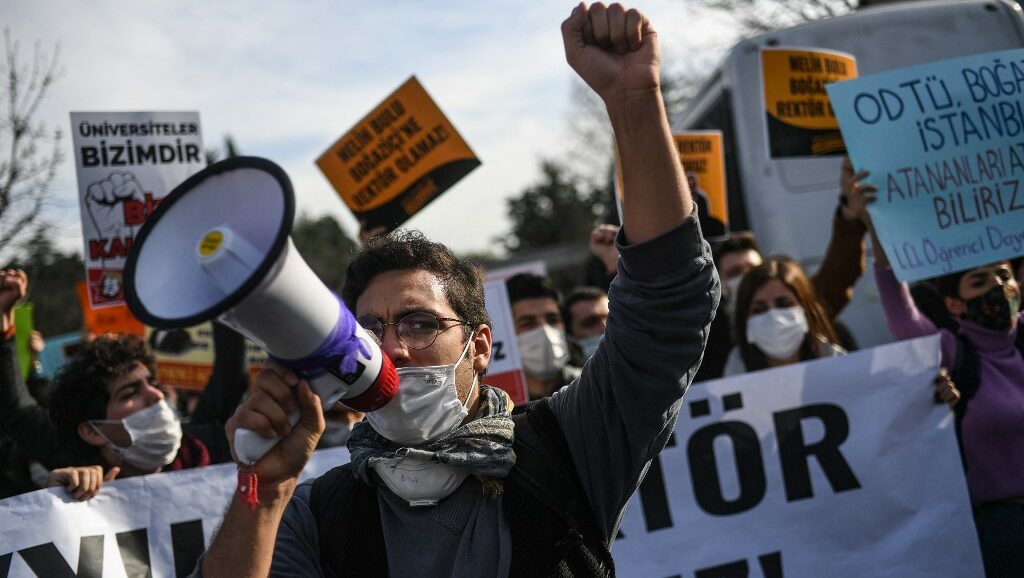Turkish authorities have put hundreds of student protesters under possible criminal investigation, Human Rights Watch (HRW) said on Thursday, releasing a report on rights violations which occurred during weeks-long protests that started in early January.
Students and alumni as well as politicians and activists have protested President Recep Tayyip Erdoğan’s decision to appoint Melih Bulu, an unsuccessful candidate from Erdoğan’s ruling Justice and Development Party (AKP) for a seat in parliament, as the university’s rector, since the beginning of January.
More than 500 people have been detained for participating in the youth-driven demonstrations that have spread to over 30 provinces across Turkey.
“Students and the academic staff of Boğaziçi University in Istanbul have exercised their lawful right to peacefully express their opposition to the appointment, which they regard as a move to impose government control over the institution and undermine academic autonomy and freedom,” the HRW statement said.
“Erdoğan’s appointment of an unelected rector to Boğaziçi University and the violent arrests of students who had peacefully protested the move encapsulates the government’s disregard for basic human rights,” said Hugh Williamson, Europe and Central Asia director at Human Rights Watch. “Imposing an unelected presidential-appointee rector on a university with no consultation demonstrates a lack of respect for academic freedom and the autonomy of universities in Turkey.”
As part of its investigation, Human Rights Watch interviewed 18 students, including four who had been released from police custody, four lawyers and two academics, analyzed images and legal documents, and monitored four student protests.
“The authorities have responded to some of the demonstrations with excessive police force, summary arrests, and targeted house raids. They arrested more than 560 protesters in all, most of whom were released after a short time. Protesters detained in Istanbul in early January, all of whom were released, told Human Rights Watch that the police conducted strip-searches and verbally abused and threatened them in some cases. Three reported that police held guns to their heads during house raids, and two said the police also slapped and insulted them.”
Erdoğan encouraged ‘tough police response’
“The president and senior officials have directly encouraged a tough police response throughout,” HRW said.
“President Erdoğan initially referred to the student protesters as ‘lazy and narrow-minded’ but, together with other government officials, later began to suggest they had terrorism links, an allegation widely used by the Turkish authorities to criminalize democratic opposition and government critics.”
Targeting of LGBT students
“Lesbian, gay, bisexual, and transgender (LGBT) students and protesters have been playing a key role in ongoing demonstrations. On January 29, the authorities initiated a targeted crackdown on LGBT students and protesters after students mounted an exhibition on Boğaziçi campus in solidarity with the ongoing protests that included, among many other pieces, an artwork depicting the Kaaba, the most important holy site for Muslims, combined with LGBT flags and a mythological creature that is half-snake half-woman. Police arrested two students who appear in a video of the exhibition that was streamed to the internet, and two others who were presumed to be among LGBT organizers on campus,” HRW said.
“The interior minister and Justice and Development Party’s (AKP) spokesperson called the students ‘perverts’ on several social media platforms, apparently alluding to the artwork. Courts placed two of the students in pretrial detention and two under house arrest on suspicion of ‘inciting hatred and enmity’.”
Students under arrest
At least 25 protesters were put under house arrest, and nine remain in pretrial detention on charges of “inciting hatred” and “violating the law on demonstrations” and for “resisting police orders.” Others were released under judicial supervision.
“The arrests and detentions come against the backdrop of heavy restrictions on public protest in Turkey; abuses of power by the government to silence critical groups; and targeting of minority groups, including LGBT people,” HRW said.
“The authorities should protect and affirm LGBT students’ rights to organize and express themselves, rather than attacking them,” Williamson said, “The Turkish authorities should respect the right to assembly, stop using abusive police power to silence dissent, and ensure the immediate release of students arbitrarily detained.”

